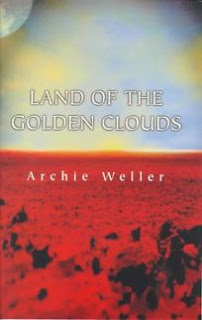Birthday Review: Land of the Golden Clouds, by Archie Weller (1998)
a review by Rich Horton
Archie Weller was born 13 July 1957. He is mixed race, Australian aboriginal and white, and he is well known and respected for his fiction on aboriginal life in contemporary Australia. In 2000 I contributed a review to the American journal Antipodes, which concerns Australian literature. I covered Weller's second novel, Land of the Golden Clouds, which is Science Fiction, as well as a rather dreadful fantasy novel, The Alchemist's Key, by Traci Harding. As for Land of the Golden Clouds, I found it a mixed bag -- a work of some ambition, that mostly fails. It's tedious for long stretches, and the SFnal aspects are pretty silly. At any rate, here's what I wrote about that book (somewhat revised for wording).
Land of the Golden Clouds is set 3000 years after a nuclear war had devastated the human technological society. Ilgar, a young man of a hunter-gatherer tribe descended from Australia's white inhabitants, is a "moon-talker", who prophesies the future based on what he sees in the night sky. His tribe and others in Australia, including the "Keepers of the Tree", descendants of the aboriginals, live in fear of night-time raids from the cave-dwelling Nightstalkers, who have migrated underground and cannot tolerate sunlight, and who prey on human flesh.
One dark night, Ilgar and his companions are attacked by a group of Nightstalkers. In the ensuing fight, all his companions are killed, as well as all but one of the attackers. This survivor is an 18 year old girl names S'shony, who has developed a reveulsion for her people's ways, after falling in love with a "Sun Person" who had been trapped under ground.
She uses her telepathic powers, as well s the love she and Ilgar begin to feel for each other, to urge him to form a band of people to travel overland to the cave of the leader fo the Nightstalkers. At this time an airplane from Jamaica, a rare outpost of advanced technology, is marooned in the area. Ilgar, now renamed Red Mond Star Light, leads a small party (including S'shony, some members of his tribe, two Keepers, and the Jamaicans) on a long treck across Australia.
This trek, perhaps extending from roughly Uluru (Ayers Rock) to Melbourne, takes up most of the novel. Along the way the group meets several other tribes with different ways, most hostile, but a few willing to join their quest. Some people are killed along the way, either as a result of the dangers of traveling in this landscape, or of the evil machinations of some of the tribes they encounter. A constant theme of the book is the way almost everyone in this future mistrusts anyone unfamiliar, and while this attitude seems in some way natural, Weller is surely suggesting that the way forward in the future is more trust and cooperation. The culmination is an exciting battle.
For me, this was about halfway to being a pretty fine post-Apocalyptic quest story. There are numerous impressive bits, such as the terrifying picture of life in the "Silver City", and also the well-done final battle. But much is silly and pointless, and the characters seem fairly stereotyped, though they do come to some life.
My major problems came in three areas. One was simply the unevenness of the telling -- long sections are very tedious. The scientific background is inane -- the depicted results of nuclear war are just wrong; and there is an added disaster that seemed unnecessary to me: an asteroid struck the Earth, which has evidently been knocked from its orbit and is slowly spiralling into the Sun. The telepathy that some tribes possess didn't convince at all. And, most tellingly, the prose was often quite weak. Certain descriptive passages were pretty impressive, but much was clunky and ungrammatical. (And the copy-editing of my edition was terrible.)
Ultimately, the novel read as a tired variation on hundreds of '50s post-Apocalyptic stories, complete with exaggerated anti-technological bias. In that way, it resembles only too many efforts by non-SF writers that tiresomely reiterate ancient clichés that they might think they are the first to offer.

No comments:
Post a Comment